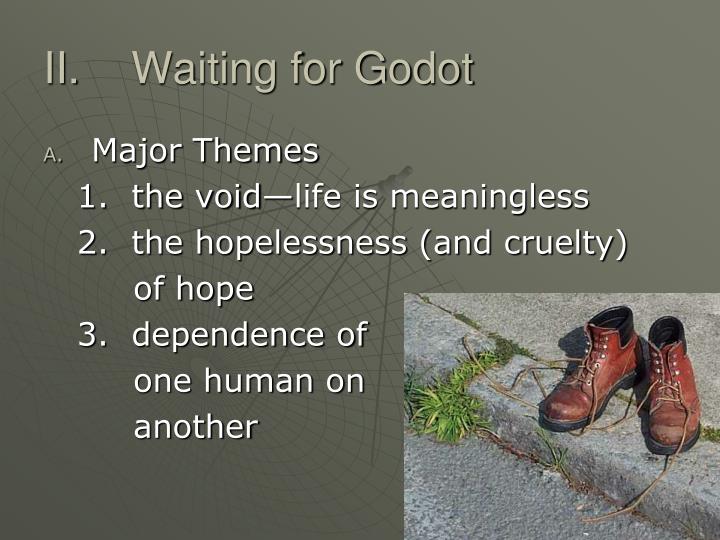


The dead feelings of Pozzo depict the hopelessness of the depressed modern man.“Waiting for Godot” is not a play to which traditional ideas of plot, action, structure etc. Lucky appears to be devoid of any human feelings except for a couple of instances. But we find him serving Pozzo very faithfully even when Pozzo has gone blind. Pozzo is so cruel to Lucky that he calls him "pig" and "hog". He carries the burden of Pozzo's luggage all the time. Pozzo feeds Lucky with the bones and leftovers of food. Lucky represents the oppressed, have-nots, bearing the drudgery and inhuman treatment of Pozzo. Pozzo is symbolic of the exploitative society. We find Pozzo, the haves, dragging Lucky by the rope in his neck. Pozzo is the master while Lucky is the slave. Though shown intermittently, yet the relationship between Pozzo and Lucky is of grave importance to the overall theme of the play. They profess "every man to his cross" that everyone has to bear the burden of his existence. Modern man is directed to a vague path leading nowhere similarly the two tramps are just making the time pass. There is loss of identity for both of them.

:max_bytes(150000):strip_icc()/druid-theatre-s-production-waiting-for-godot-at-the-royal-lyceum-theatre-in-edinburgh-1013133540-f0ec7a598ec642beb0b884bbb7e0fb6c.jpg)
The human race is as lost as the two tramps. They may be seen as paralleled (in relationship) to human society. The two tramps have symbolic significance and are related to human society in general. Both of them are waiting for ever and ever. They are waiting for some help from Godot. Both of them convey the sense of human inability to act. Estragon remarks: "They all change, only we can't". Everything seems to be changing around them but they can't. Estragon echoes "Nothing happens, nobody comes, nobody goes, it's awful.". Estragon is presented in physical pain while Vladimir is silent and thoughtful. Estragon is an emotional fellow always complaining and shouting. Vladimir is a strong and shielding friend. Though they are identical and comparable in several aspects, yet they are different personalities having the same sense of loss and painful existence. They are waiting for Godot, a mysterious and dubious character symbolizing God. The two tramps, Estragon and Vladimir, are parallel to each other. The impact of time reflects the burden of existence for these characters which is contrasted and reflected in their relationships. Probably, it is due to these relationships that the characters are able to bear the pain and misery. The relationships are important in associating rays of hope, sympathy and wit as well. The characters are dependent on each other. The characters and relationships create a sheer sense of loss and chaos. As a result of these relationships, the playwright is successful in depicting the themes of paralysis, delusion ignorance, loss of memory and uselessness. There are three pairs of characters: primarily, the attachment between Vladimir and Estragon, intermittently, the association between Pozzo and Lucky, and the relationship between the tramps and the mysterious character, Godot. Becket has used pairing and parallels in establishing the relationships of the characters in such a way as to project the miserable plight of man. In "Waiting for Godot", Samuel Becket has portrayed a dismal and shocking condition of man. Discuss the importance of parallelism in "Waiting for Godot".


 0 kommentar(er)
0 kommentar(er)
